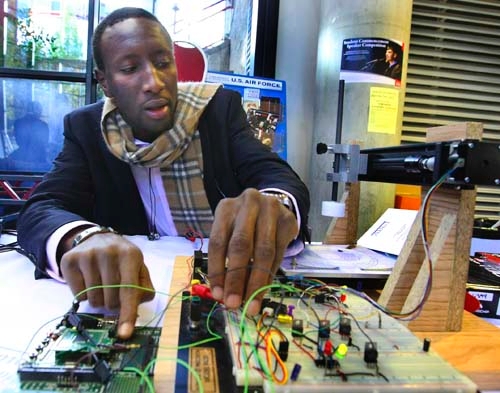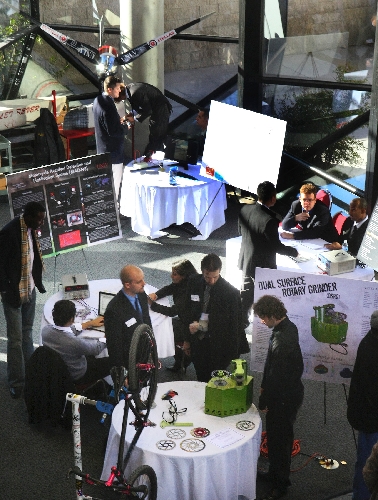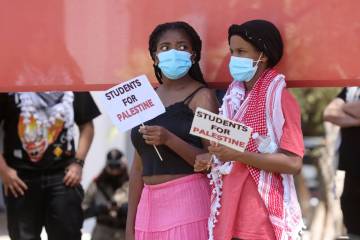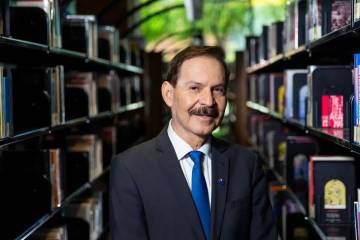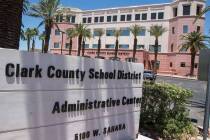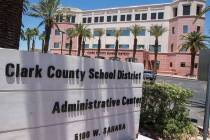UNLV engineering students mean business
Every semester, UNLV's graduating seniors in engineering must team up with small groups of other students, design a product, build it and show how it could solve a real-world problem.
This past week, this semester's projects were put on display and judged by a panel of experts in what is called the senior design competition.
Over the last 10 years, since the competition was implemented, there have been scores of projects. Some seemed innovative and filled with potential. A home security robot, a cane for the blind that uses sonar, motorcycle headlights that see around corners.
But not a single one has actually taken off, businesswise.
That bothered Rama Venkat, the interim dean of the Howard R. Hughes College of Engineering. Venkat got to talking about it with Paul Jarley, the dean of the College of Business.
They came to a conclusion: The engineering students should team up with the business students. The engineers would design and build the thing. The business students would figure out how to sell it, and to whom.
Engineers, after all, can be pretty good at figuring out problems and solutions. But they're not always great at figuring out what people want or what makes a product easy to use.
"If we had left it up to the engineers, there'd be a hundred more buttons on the iPod," Jarley said.
All of that sounded like a goofy idea to some of the engineering students.
Take the team of Baldomero Corona, Siul Ruiz and Francisco Sermeno, for example. They designed and built a better moving dolly. It can lift up to 300 pounds three feet into the air. Need to get the fridge into the back of a pickup? This is your tool.
They were skeptical of teaming up with the business students, they said.
Until they saw the results.
"They said we could make $23 million after five years," Corona said. "We thought we'd be able to sell 20 of these and make our money back."
The business team figured out the dolly could be used by moving companies, do-it-yourselfers, big box stores, rented out by companies such as U-Haul, that sort of thing. If they outsource the manufacturing, it will cost less than similar products already on the market.
The team is hoping to hook up with some venture capitalists who will finance the project. So does just about every other team in the competition.
The grand prize winner turned out to be a project that reimagines how the city of North Las Vegas manages its wastewater.
Winners in various categories included a proposed redevelopment project for Maryland Parkway, a quick-loading magazine for a .22-caliber rifle, a contraption that scans uranium samples, and a solar-powered water purification system.
That last one came from the team of Wali Zaidi, David Altum and Jorge Rivera. They said they got the idea for it after the earthquake in Haiti.
Their project could produce up to 40 gallons of clean water a day from polluted sources without any outside electricity to run it.
They could build bigger ones for entire villages, or really small ones for backpackers and campers. They could make a lot of money.
Or maybe not. It depends on more than their product. There is a business plan to consider, patents, marketing, etc.
Which is why the two deans said the business students will get involved even earlier next semester. They will be in on the design and execution of the engineering projects from the beginning, before there's even a concept.
Venkat, the engineering dean, said he is trying to get some University of Nevada, Las Vegas graduates who have become attorneys to help students navigate the complicated patenting process.
After that, who knows?
Maybe one of these student teams will come up with something revolutionary. Maybe they'll actually be able to sell it. Maybe they'll make $23 million and maybe the university will get a slice of that, too.
Contact reporter Richard Lake at rlake@reviewjournal.com or 702-383-0307.



